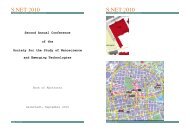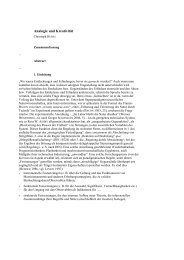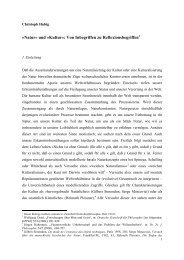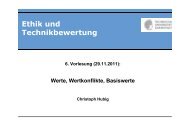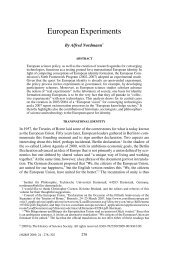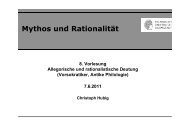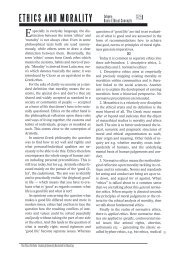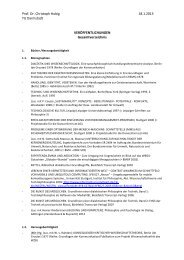If and Then: A Critique of Speculative NanoEthics - Common Sense ...
If and Then: A Critique of Speculative NanoEthics - Common Sense ...
If and Then: A Critique of Speculative NanoEthics - Common Sense ...
Create successful ePaper yourself
Turn your PDF publications into a flip-book with our unique Google optimized e-Paper software.
Nanoethics (2007) 1:31–46 41<br />
our values are not shared <strong>and</strong> need not be relevant to<br />
these other cultures, to the envisioned future or some<br />
remote past. This is at the same time our moral<br />
predicament <strong>and</strong> our most considered point <strong>of</strong><br />
departure. Rather than adopt a believing attitude<br />
towards the future, an ethics beholden to present<br />
capabilities, needs, problems, <strong>and</strong> proposed solutions<br />
will begin with vision assessment [12]. Envisioned<br />
technologies are viewed as incursions on the present<br />
<strong>and</strong> will be judged as to their likelihood <strong>and</strong> merit:<br />
How credible are these claims, <strong>and</strong> do these technologies<br />
solve acknowledged problems? More generally:<br />
What do these visions tell us about the present, what<br />
is their implicit criticism <strong>of</strong> it, how <strong>and</strong> why do they<br />
require us to change?<br />
To take as the starting point for ethical deliberation<br />
our historically contingent situation amounts to an<br />
acknowledgement <strong>of</strong> the ineluctable frailty <strong>of</strong> such<br />
situations <strong>and</strong> <strong>of</strong> the subjects who seek orientation in<br />
them. Accordingly, ethics, art, <strong>and</strong> technology are all<br />
viewed as that which helps a frail <strong>and</strong> changeable<br />
being come to terms with the world. 27 It is not<br />
addressed to an entirely fictitious entity, a god, future<br />
existence, or to a body-part that dem<strong>and</strong>s better<br />
treatment:<br />
It is a loathsome <strong>and</strong> cruel trick that nature takes<br />
such an exquisitely wondrous creation as the<br />
human brain <strong>and</strong> imprisons it inside the weak,<br />
inefficient, fragile, <strong>and</strong> short-lived structure that is<br />
the human body. Our bodies may be beautiful, but<br />
they are unacceptably ephemeral. [33, p. 191]<br />
In contrast, ethics, art, technology have to accept<br />
<strong>and</strong> underst<strong>and</strong> our ephemeral existence in order to<br />
design prostheses, conceptual schemes, social<br />
arrangements in which our traditions, inventions,<br />
thoughts can survive <strong>and</strong> do some work even beyond<br />
the physical existence <strong>of</strong> any individual person.<br />
Imagining Humanity<br />
There is another reason for taking human frailty <strong>and</strong><br />
contingency as a limited <strong>and</strong> limiting starting point.<br />
27 Thus, technology is brought back into the realm <strong>of</strong> history<br />
rather than merely <strong>of</strong> temporality. As opposed to a temporal<br />
process in physics, a historical process is characterized by the<br />
fact that historical agents change <strong>and</strong> do not continue unaltered<br />
on some linear or exponential trajectories <strong>of</strong> realization,<br />
intention, technological progress.<br />
It is strictly speaking impossible to imagine ourselves<br />
as something other than we are. Accordingly, we<br />
cannot conceive even our admittedly transitory<br />
natures or changing selves as currently deficient <strong>and</strong><br />
at another time fully realized. All we can do is to first<br />
project our selves as technical systems outside <strong>and</strong><br />
independent <strong>of</strong> ourselves <strong>and</strong> then to imagine human<br />
perfectibility as the improvement on given parameters<br />
in that technical system. As before, the discourse on<br />
human enhancement technologies gains traction once<br />
we take that leap <strong>and</strong> dissociate the human being qua<br />
technical system from the place where our wants <strong>and</strong><br />
desires have been shaped <strong>and</strong> seek expression. 28 Only<br />
once this leap is taken, does the contest between<br />
consequentialist <strong>and</strong> deontological positions begin:<br />
who is to say that improvements to human performance<br />
parameters will be bad on balance, <strong>and</strong> can we<br />
really claim an unalienable integrity for the human<br />
being as a technical system?<br />
This is not the place to fully develop this point<br />
which is most forcefully made by Jean-Pierre Dupuy<br />
in his critique <strong>of</strong> such a dissociated, “algorithmic”<br />
conception <strong>of</strong> nature <strong>and</strong> self [9]. Such a development<br />
would have to begin with arguments for the claim that<br />
it is impossible to imagine ourselves as something<br />
other than we are. 29 One such argument would refer<br />
to the ways in which we are always implicated in the<br />
perspective on ourselves. Even “lost souls” who wish<br />
they didn’t have their bodies or their lives want<br />
something better for themselves. There is a less<br />
esoteric way <strong>of</strong> making this argument, however. It<br />
follows roughly along these lines: <strong>If</strong> we conceive <strong>of</strong><br />
28 Why should anyone take this leap? The if-<strong>and</strong>-then strategies<br />
suggest that this is not for us to decide since this way <strong>of</strong><br />
conceiving the body is upon us already along with the requisite<br />
enhancement technologies. But it is far from clear that even<br />
someone who takes Viagra or undergoes cosmetic surgery (<strong>and</strong><br />
who is thus acutely aware <strong>of</strong> the frailty <strong>of</strong> his or her body) is<br />
therefore committed to a notion <strong>of</strong> technological transcendence<br />
<strong>of</strong> human limitations (see the discussions above).<br />
29 Transhumanists need not maintain, <strong>of</strong> course, that they can<br />
intelligibly imagine themselves to be other than they are.<br />
Indeed, the “singularity” may be welcome precisely because it<br />
involves an utterly surprising transformation – like falling in<br />
love, going to the theatre, undergoing therapy, or any other<br />
pr<strong>of</strong>oundly “life-altering” experience (which can be had, <strong>of</strong><br />
course, without pursuing the dream <strong>of</strong> transhumanism).<br />
However, it requires some such imagination <strong>of</strong> an enhanced<br />
self to expect from technology that it will produce a new,<br />
exp<strong>and</strong>ed, or in some respect less limited (trans-) human being.





